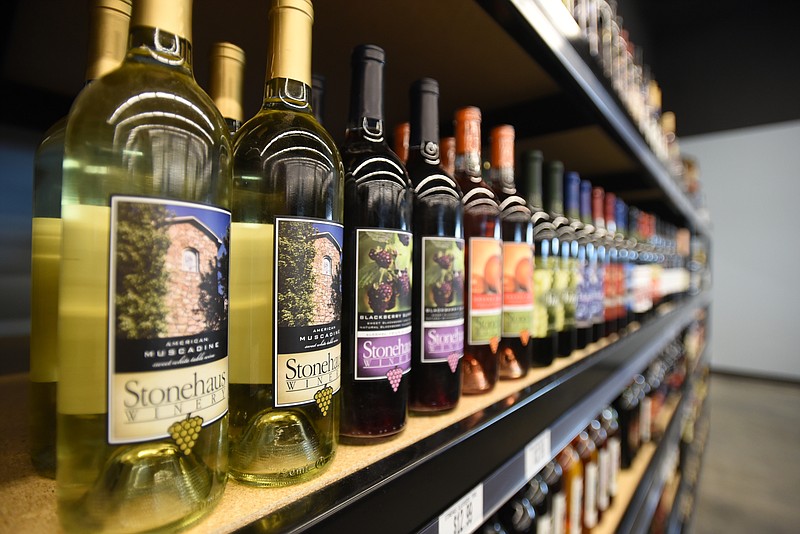Voters in three rural Southeast Tennessee towns and the city of East Ridge overwhelmingly approved liquor referendums Tuesday.
Election results in all four towns still must be certified by county election commissions and provisional ballots have not been tallied completely in some counties.
East Ridge voters in Hamilton County favored a referendum on retail package liquor sales, 6,264 to 2,159, in a landslide approval of the measure, according to Tuesday's election results.
East Ridge Mayor Brian Williams said Thursday that he was "very excited" by the passage of the referendum.
"This will allow East Ridge to provide liquor stores in our city and collect the tax revenue that that was lost in the past by patrons visiting other liquor stores" outside the city, he said in an email.
Williams said city officials now will work to prepare adequate rules and regulations for the initiative.
In Marion County, Whitwell voters also strongly favored referendums for liquor-by-the-drink and package sales. On the referendum for consumption of alcohol on premises, the tally was 385 for and 199 against. On the referendum for package sales, 408 Whitwell voters said yes while 184 opposed the measure, results show.
Whitwell Mayor Terry "Fuzz" Parker said he and the majority of residents believe passing the referendums will have a positive impact on the community.
"As times have changed over the years and the cost of everything [is] going up, our small towns are struggling," Parker said. "Any revenue we can get in to help our small town and do the things we want to do to benefit our community, I'm all for it."
Parker said he thought Whitwell voters recognized the financial benefits of passage for the town and they liked the idea for personal reasons, too.
"When they go out to eat they enjoy a drink with their meals," he said. "That's just the way things are these days and that's how they spend their family time.
"I appreciate the citizens going along with us on it," he said. "They know where our needs are."
In Powell's Crossroads, Whitwell's Marion County neighbor, a package sales referendum netted 418 votes in favor and 209 against, results shows.
Powells Crossroads Mayor Dwight Richards said passage of the measure will help town coffers and economic growth, and that's something he and town aldermen are excited about.
"Our town is composed of a population of 1,352 residents with limited businesses," Richards said. "The revenue from the retail package store will allow more opportunity to generate more revenue for our town to grow."
Over on the eastern side of Walden's Ridge, Spring City voters in Rhea County overwhelmingly favored package sales of alcohol 515 to 219, according to election results. Spring City approved liquor-by-the-drink in 2010.
Spring City mayor Woody Evans said voters there recognize the financial benefit for the town.
"People's attitudes are changing, good or bad, but they are changing," he said, noting that city officials will take their time in establishing the rules.
"Generally, the revenue off of it is usually a little better than some of the other revenue streams you can generate," Evans said.
"It's kind of uncharted territory," he said.
Over the last couple of decades, formerly dry, rural Southeast Tennessee cities gradually began placing measures before voters.
The Sequatchie Valley counties of Bledsoe, Marion and Sequatchie have increasingly indulged liquor in their communities, following in the footsteps of towns like Cleveland in Bradley County and Athens in McMinn County. Athens approved liquor back in the early 2000s, Cleveland and all of unincorporated Marion County approved referendums in 2018, Dunlap in Sequatchie County approved a liquor referendum in 2008, and the town of Pikeville up the road in Bledsoe County shot down referendums in 2010, then favored package stores narrowly in 2012. Voters in Dayton, the county seat in Rhea County - where Spring City voters just OK'd the ballot question - gave the nod on a liquor referendum in 2017, and Tracy City voters in Grundy County approved referendums in 2018.
"This is really about consumer choice and giving the consumer what he or she wants today," David Ozgo, chief economist for the Distilled Spirits Council of the United States, said.
Ozgo said most towns already have legal sales of beer, so the question has become more a matter of convenience than a moral choice when it shows up on voters' ballots.
He noted that the growth of craft distillers - there are 10 craft distillers in Tennessee, including Chattanooga Whiskey, and more than 2,000 nationwide - is attracting new customers and creating more local consumer interest.
With those investments in mind, Ozgo said people are more likely to see a liquor referendum linked to the local economy, and the distiller and consumers become a part of the same community.
"Anytime you give people flexibility, it's almost always good for the economy," he said.
Contact Ben Benton at bbenton@timesfreepress.com or 423-757-6569. Follow him on Twitter @BenBenton or at www.facebook.com/benbenton1.
